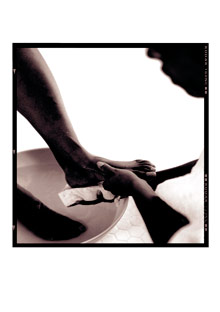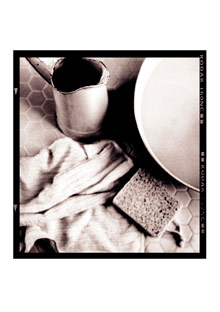
Photo: Rob Howard
You wash my feet, I'll wash yours—seriously? In an ancient ritual, Edwidge Danticat finds humility, bonding, and a surprising sense of courage.
I occassionally attend a very small church, where once a month the members take turns washing each other's feet. Though I had been visiting for some time, it took me a while to build up enough courage to participate. First of all, I don't have pretty feet. Unwilling to put anything between the ground and myself—unless it's a really cold day or I'm going out—I mostly go barefoot, which has led to my having chronically cracked heels and thick, unseemly soles. Which is only partly why I approached the foot washing with a mixture of trepidation and horror. The other reason was that I thought it was yucky.Foot washing, our minister has often said, was common in many ancient cultures, where it was considered courteous to offer a guest a basin of water to tidy up his feet upon his arrival. Usually the visitor, who most likely had traveled long and dusty distances in sandals, would wash his own feet. In cases where the visitor was an especially treasured or important person, the head of the household might do it. The cleansing of soles in a religious context has its model in Jesus washing the feet of his disciples at the Last Supper. If he could humble himself before them, he told the disciples, so could they be humble in their treatment of each other.
I kept reminding myself of all this as I entered the plain white room off the main sanctuary where the foot washing was to take place. It was Easter, one of the most important dates in the religious calendar, if not the most, and everyone in the congregation was going to take part. The moment itself was a lot more intimate than I'd expected. Rather than a group wash, where a leader cleanses the feet of an entire congregation, we would go in two by two. Only one other woman would be in the room with me. When I walked in, she was already sitting on a low stool near a white ceramic basin and seemed to have been waiting for me. I didn't know that particular woman very well, but I knew her story. A year ago, pregnant with her third child, she was placed on bed rest for several months after her blood pressure had risen out of control. Not being a close friend, I hadn't visited her. Still, when she returned to church with her baby, an especially large and happy boy, she blissfully embraced everyone, including me, thanking us for our prayers and moral support.

Photo: Rob Howard
In the foot washing room, without speaking, she motioned for me to move closer and sit on the higher stool in front of her. I slipped my shoes off my feet, which I had scrubbed especially hard for the occasion, and let them sway above the water. Leaning forward, head bowed, she carefully guided them into the basin with her hands. The water was welcoming and warm, and as her fingers cupped handfuls and poured them over my toes, I felt ticklish. When I plunged my soles deeper into the basin, she gently massaged my arches. After she was done, she toweled my feet dry and helped me place them back in my shoes.
We switched places and now it was my turn at her feet, which unlike mine were fine, beautiful, well manicured.
I could suddenly see her staring at them, propped up for weeks as she lay in bed, hoping, waiting, and dreaming about a future with her son. Grabbing them tighter than I'd hoped, I gave her a real scrubbing, as though she were a dusty-footed visitor who'd just entered my home. Her face did not betray the surprise she must have felt. This was symbolic after all. But having never done it before, I knew no other way.
With her feet in my hands, I couldn't help but think of a reflexology chart I'd once seen, a diagram that linked various parts of the foot to different organs in the body. Here I was, connecting to her brain by maneuvering her big toes, and to her kidneys, lung, and heart by rubbing the middle of her feet. The place she held her son, I had under my pinky. Through touch, we were thoroughly linked not just symbolically but for real.
Going in, I knew this would be a humbling experience. I had read about nuns in India who'd washed the feet of lepers to teach themselves the lessons of true humility. What I didn't expect was that it would also make me feel stronger in a way one experiences only by extending oneself, one's hand, unguardedly toward another.
After we finished, the woman and I hugged. We lingered in our embrace, purposefully acknowledging that we now knew each other in a slightly different way than we had before. We touch the people we love all the time, I exuberantly told her, or at least we should. But to touch someone we don't know as well can feel bold, even dangerous. That is until our life paths surprisingly merge, if even for an instant, among fingers and toes and water.
We switched places and now it was my turn at her feet, which unlike mine were fine, beautiful, well manicured.
I could suddenly see her staring at them, propped up for weeks as she lay in bed, hoping, waiting, and dreaming about a future with her son. Grabbing them tighter than I'd hoped, I gave her a real scrubbing, as though she were a dusty-footed visitor who'd just entered my home. Her face did not betray the surprise she must have felt. This was symbolic after all. But having never done it before, I knew no other way.
With her feet in my hands, I couldn't help but think of a reflexology chart I'd once seen, a diagram that linked various parts of the foot to different organs in the body. Here I was, connecting to her brain by maneuvering her big toes, and to her kidneys, lung, and heart by rubbing the middle of her feet. The place she held her son, I had under my pinky. Through touch, we were thoroughly linked not just symbolically but for real.
Going in, I knew this would be a humbling experience. I had read about nuns in India who'd washed the feet of lepers to teach themselves the lessons of true humility. What I didn't expect was that it would also make me feel stronger in a way one experiences only by extending oneself, one's hand, unguardedly toward another.
After we finished, the woman and I hugged. We lingered in our embrace, purposefully acknowledging that we now knew each other in a slightly different way than we had before. We touch the people we love all the time, I exuberantly told her, or at least we should. But to touch someone we don't know as well can feel bold, even dangerous. That is until our life paths surprisingly merge, if even for an instant, among fingers and toes and water.




